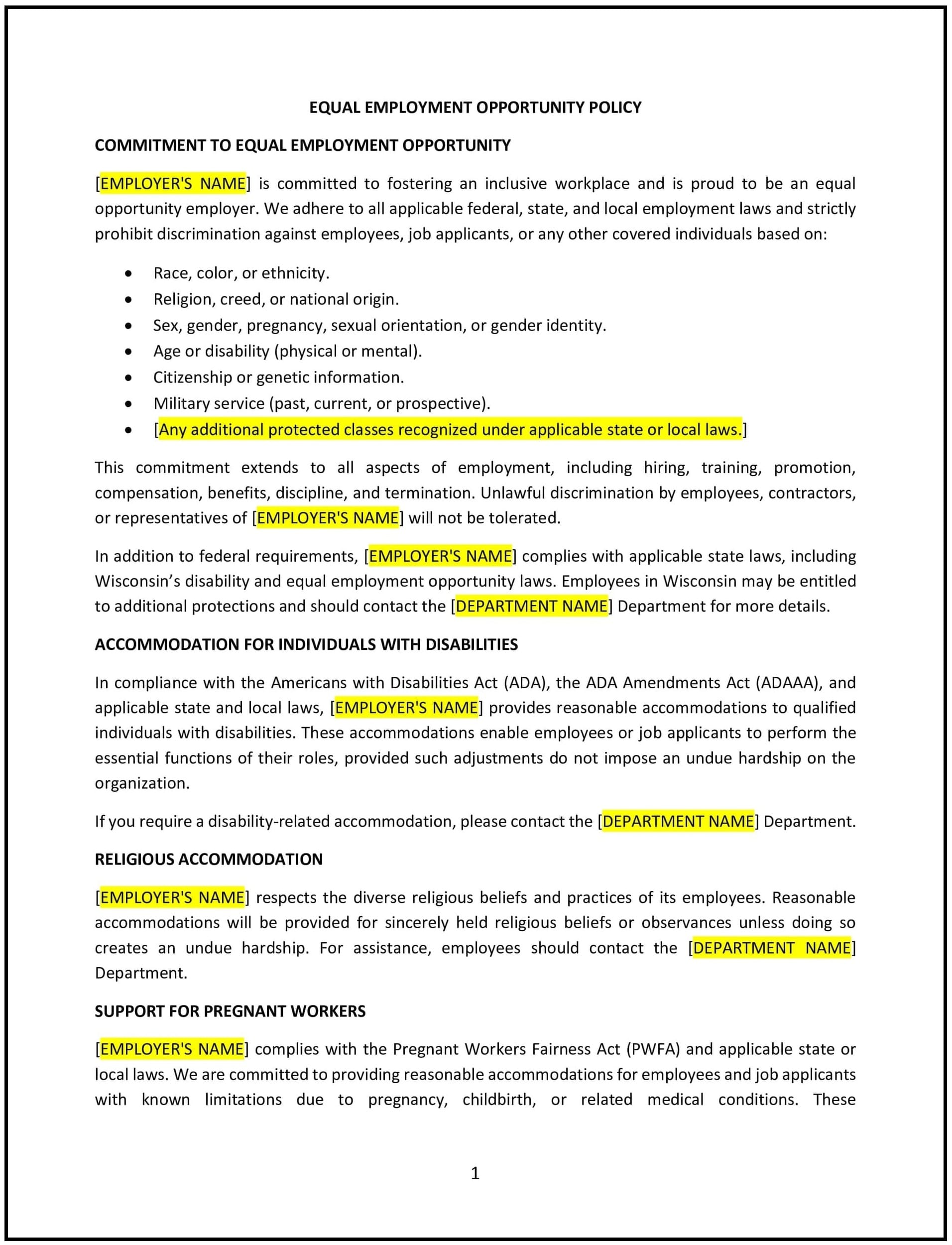Equal employment opportunity policy (Wisconsin): Free template
Got contracts to review? While you're here for policies, let Cobrief make contract review effortless—start your free review now.

Customize this template for free
Equal employment opportunity policy (Wisconsin)
An equal employment opportunity (EEO) policy helps Wisconsin businesses ensure fair treatment of all employees and applicants by prohibiting discrimination based on race, color, religion, sex, national origin, age, disability, or genetic information. This policy establishes the company’s commitment to providing a diverse, inclusive, and equitable workplace for all individuals, regardless of background or personal characteristics.
By implementing this policy, businesses can promote diversity, reduce the risk of discrimination claims, and foster a positive, inclusive work environment that respects and values the contributions of every employee.
How to use this equal employment opportunity policy (Wisconsin)
- Define equal opportunity: Clearly define what equal employment opportunity means within the company, including the commitment to providing all employees with fair and equal access to employment, training, and advancement opportunities.
- Specify protected characteristics: Outline the characteristics that are protected by law under Wisconsin state and federal law, including race, color, religion, sex, national origin, age, disability, and genetic information, and clarify that discrimination based on these characteristics is prohibited.
- Address hiring practices: Establish procedures to ensure that recruitment, hiring, and promotion practices are conducted without bias and are based solely on the candidate’s qualifications, experience, and job performance.
- Encourage diversity and inclusion: Promote diversity in the workplace by actively seeking candidates from diverse backgrounds and ensuring that all employees feel valued, respected, and included.
- Implement anti-harassment measures: Reinforce that discrimination, harassment, and retaliation are prohibited by the company, and outline procedures for reporting harassment or discriminatory behavior. Make clear that employees will not face retaliation for filing complaints or participating in investigations.
- Provide reasonable accommodations: Specify the process for providing reasonable accommodations for employees with disabilities, in compliance with the Americans with Disabilities Act (ADA) and Wisconsin state law, ensuring that all employees can fully participate in the workplace.
- Ensure training and education: Provide regular training to employees and managers to promote understanding of equal employment opportunity principles and prevent discrimination and harassment.
- Create a complaint process: Outline the steps employees can take if they believe they have been subject to discrimination or harassment. Ensure that the process is clear, confidential, and free from retaliation.
- Commit to compliance: Ensure that the company complies with all applicable Wisconsin state laws and federal regulations regarding equal employment opportunity, including the Civil Rights Act, ADA, and the Equal Employment Opportunity Commission (EEOC) guidelines.
Benefits of using this equal employment opportunity policy (Wisconsin)
This policy offers several benefits for Wisconsin businesses:
- Promotes diversity and inclusion: The policy helps foster a diverse workforce by ensuring that all employees are given equal opportunities, which can lead to greater creativity, innovation, and team collaboration.
- Reduces legal risks: By committing to equal employment opportunity principles, businesses can reduce the risk of discrimination claims, lawsuits, and penalties under state and federal laws.
- Enhances company reputation: A commitment to diversity and equal opportunity enhances the company’s reputation, making it an attractive employer for top talent from diverse backgrounds.
- Improves employee morale and retention: Employees who feel valued and respected are more likely to be satisfied with their work environment, which can lead to increased productivity, morale, and retention.
- Promotes compliance: The policy helps promote compliance with Wisconsin state and federal employment laws, reducing the risk of legal challenges and penalties.
Tips for using this equal employment opportunity policy (Wisconsin)
- Communicate the policy clearly: Ensure that all employees understand the EEO policy, their rights, and their responsibilities. Regularly reinforce the policy through training, employee handbooks, and internal communications.
- Foster a culture of inclusivity: Beyond the policy, ensure that the company’s leadership and management demonstrate a commitment to diversity and inclusion through their actions and decisions.
- Implement bias-free hiring practices: Establish structured, unbiased recruitment and selection processes to ensure that all candidates are evaluated based on their qualifications and experience, not personal characteristics.
- Regularly review the policy: Periodically review the EEO policy to ensure it remains compliant with updated laws, regulations, and business needs. Make updates as necessary to address emerging issues or challenges.
- Encourage employee feedback: Encourage employees to share their concerns about equal opportunity and inclusivity in the workplace. Actively listen to their feedback and take appropriate steps to address issues that arise.
- Ensure support for reporting issues: Make sure employees feel comfortable reporting any instances of discrimination or harassment by providing multiple reporting channels and ensuring confidentiality and protection from retaliation.